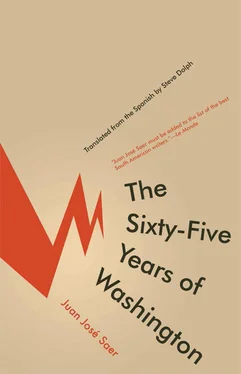Juan José Saer - The Sixty-Five Years of Washington
Здесь есть возможность читать онлайн «Juan José Saer - The Sixty-Five Years of Washington» весь текст электронной книги совершенно бесплатно (целиком полную версию без сокращений). В некоторых случаях можно слушать аудио, скачать через торрент в формате fb2 и присутствует краткое содержание. Год выпуска: 2010, Издательство: Open Letter, Жанр: Современная проза, на английском языке. Описание произведения, (предисловие) а так же отзывы посетителей доступны на портале библиотеки ЛибКат.
- Название:The Sixty-Five Years of Washington
- Автор:
- Издательство:Open Letter
- Жанр:
- Год:2010
- ISBN:нет данных
- Рейтинг книги:3 / 5. Голосов: 1
-
Избранное:Добавить в избранное
- Отзывы:
-
Ваша оценка:
- 60
- 1
- 2
- 3
- 4
- 5
The Sixty-Five Years of Washington: краткое содержание, описание и аннотация
Предлагаем к чтению аннотацию, описание, краткое содержание или предисловие (зависит от того, что написал сам автор книги «The Sixty-Five Years of Washington»). Если вы не нашли необходимую информацию о книге — напишите в комментариях, мы постараемся отыскать её.
The Sixty-Five Years of Washington — читать онлайн бесплатно полную книгу (весь текст) целиком
Ниже представлен текст книги, разбитый по страницам. Система сохранения места последней прочитанной страницы, позволяет с удобством читать онлайн бесплатно книгу «The Sixty-Five Years of Washington», без необходимости каждый раз заново искать на чём Вы остановились. Поставьте закладку, и сможете в любой момент перейти на страницу, на которой закончили чтение.
Интервал:
Закладка:
— They can cut one of my nuts off if I know what’s bugging him, he says, exaggerating his annoyance.
And both of mine if I have to keep at it with these clowns , Leto thinks, but while he resumes his walk next to the Mathematician, who with a single stride has reached him and continues without stopping, instead of showing his irritation, he assumes an impartial attitude and says:
— You can tell a mile off that he’s not well.
The Mathematician does not answer, wrestling, somewhat exultant, his head held upright, with the quick bind of his own disquisitions, and Leto abandons him to his silence. In any case, for several minutes, he has been withdrawing from the bright street, from the October morning, immersed, as they say, in a single object, the damned revolver that the man — his father, that is — insolently according to Rey, and no doubt resolute, had raised to his temple the year before, taking care not to fail as regards the results — a discreet but familiar object that he, even as a child, would from time to time withdraw from the wardrobe, where it was stored in a wooden box with other knickknacks, so he could play gunslinger. Once, in the middle of a fight, Isabel ran to the bedroom melodramatically and took from the wardrobe, and from the box, the revolver that he, Leto, no? knew wasn’t loaded, while his aunt Charo, who had arrived in the middle of the fight, struggled to pry it from her hands. They cried and argued while the man, without saying a word, had locked himself in the garage to clean up the tools that Isabel, a few minutes before, in the fury of the argument, had thrown to the ground, cables, screws, parts, radio bulbs smashed to pieces, against the man’s unfazed silence, his father, no? who didn’t even assume a stoic or resigned expression — nothing like that, no, nothing, not a single theatrical gesture, no intemperance, a creature made from material that, in contrast to the appliances he assembled and dismantled, built of countless small parts and interdependent fragments to make them work, seemed solid, without internal turmoil, lacking external signals to betray any contradiction, absorbed in preparation for the single act he would carry out years later, intending to obliterate, the way someone might flick a fuzzball from their shoulder, the vulgar error that the indistinct shades clattering around him called the outside world. He must have been eight or nine at the time — Leto and the Mathematician cross, oblivious, just like many other pedestrians, who move around them in every direction, down the street and the sidewalk, from south to north, from north to south, from east to west, from west to east, tracing straight, oblique, parallel or diagonal trajectories, the intersection where a row of cars waits, you could say, patiently and resigned. Eight or nine, only, because, and this he remembers well, the garage was the one in Arroyito. It must have been three or four in the afternoon on a summer day, a silent siesta whose brightness was dimmed by the dark screens on the doors and windows, protecting the house, clean and cool thanks to Isabel’s persistent work, which in spite of the nightly weeping she cleaned, swept, and polished, without missing a single corner, humming, no? every morning. The man was in the workshop, in the garage; Isabel, dressed to go out, was waiting for Charo somewhere in the house; he, Leto, stretched out face up across his bed, his head hanging a little over the edge, held his arm up and, with the back of his hand fifty centimeters from his head, was wiggling his fingers without stopping, not closing them and keeping them well-separated, fascinated by their shape and by the movement they were capable of, personifying each of them a little, while at the same time, his mouth open, he amused himself by making his vocal chords vibrate, emitting a string of guttural and somewhat fractured sounds, changing the sound every so often, going from an a to an e , to an i , going back to the first one, or vocalizing all of the vowels one after the other and modulating, like a virtuoso, the intensity of the vibrations. With a strange curiosity, he seemed to touch certain regions of his own body the same way that, he might say, now that he’s older, he would have tried out a new suit the night before a wedding. His fascination was so intense that, when the shouting started, a long moment elapsed before he heard it, and when he got up and walked slowly toward the workshop, where the shouts seemed to be coming from, his alarm did not efface the curiosity, but rather made it change direction. Both of them were in the workshop; Isabel, crying and gesticulating, was hitting the man on the chest and face, not with her hands or her fists, but with her forearms, while the man, rigid and leaning back somewhat, received this without moving or reacting, his eyes wide open, more questioning and patient than surprised, so unfazed that Isabel, humiliated and enraged by this new disillusion being inflicted on her, after looking around a moment, distractedly, for something to discharge herself against, found the long, pine work table and, again with her forearms, keeping her fists shut tight like two stumps, started sweeping the surface of the table, throwing everything on it to the floor. She only opened her fists when some object resisted and she was forced to grab it in order to smash it against the concrete floor. Calm, unfazed, not even pale or with his lips pressed together, the man followed her, gathering up the falling objects and calculating with a professional objectivity, before returning it to its place, the damage it might have suffered. The scene lasted a few minutes until Isabel, realizing that everything in existence, independent, outside herself, was intractable and would not bend, took on an extremely intense expression — of resolve, possibly — and started running toward the bedroom. He followed her, knowing that the man, behind him, as though he were alone in the house, would continue piecing together, slowly and meticulously, his working materials. Leto saw his aunt Charo, who has coming in from the street just then, look once at Isabel and take off running after her toward the bedroom. He saw them struggle, fighting for the unloaded revolver, and when Isabel finally gave up, Charo took hold of the revolver, put it in the box, and replaced the box in the wardrobe, and when she closed the wardrobe door Leto could see, reflected in the mirror, an image of Isabel, standing near the wardrobe, the image of Isabel perfectly reversed, the image that, when the door closed completely, disappeared from sight. Finally, Isabel let herself fall, sitting on the edge of the bed, and for several minutes aunt Charo, crying a little as well, tried to console her. He, Leto, no? observed this from the doorway, expecting, hoping almost, maybe without realizing it, that they would not notice his presence but, as though she had read his thoughts, maybe because she had read them, Isabel, who had now calmed down somewhat, locked eyes with him, and assuming a fatigued and commiserative expression, made a gesture that, as he was perceiving it, he tried to exorcize with all his strength so that it wouldn’t be produced, knowing that she would hold out her hands in his direction, encouraging him to curl up with them, and when he saw the soft and round arms calling him, he took off running and shut himself in his room. He stayed there until dark, not thinking that he was shutting himself in, unworried and without remorse — no, he stayed there playing and hearing, every so often, the sounds of the house, the man from time to time leaving the workshop to go to the bathroom or the kitchen, the return of Isabel, humming, seeming contented again and a little self-absorbed, and starting to make dinner. When he realized it was time to eat, he went out to the kitchen and helped set the table. She seemed refreshed and calm, careful and nimble in her domestic chores, satisfied almost, and at eight or nine years old, those inexplicable but seemingly authentic changes in mood mesmerized him. When everything was ready, she told him to go call the man to the table, so Leto, unhurried, crossed the house and, through the half-open door, peeked in to the workshop installed in the garage.
Читать дальшеИнтервал:
Закладка:
Похожие книги на «The Sixty-Five Years of Washington»
Представляем Вашему вниманию похожие книги на «The Sixty-Five Years of Washington» списком для выбора. Мы отобрали схожую по названию и смыслу литературу в надежде предоставить читателям больше вариантов отыскать новые, интересные, ещё непрочитанные произведения.
Обсуждение, отзывы о книге «The Sixty-Five Years of Washington» и просто собственные мнения читателей. Оставьте ваши комментарии, напишите, что Вы думаете о произведении, его смысле или главных героях. Укажите что конкретно понравилось, а что нет, и почему Вы так считаете.












